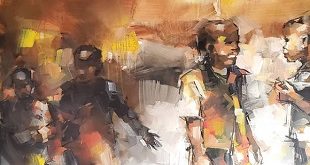
By Patrick Kagenda
Cheers and tears as Busoga becomes kingmakers’ arena
Friday, Sept. 12 was a day like no other in Jinja, the main town in the Obwakyabazing Bwabusoga kingdom on the shores of Lake Victoria in central eastern Uganda. The impending coronation of Prince Nadiope Gabula IV as king of Busoga had infused a frenzy to life in this usually quiet town. But tension was high as, in one corner of the town, just a few minutes’ drive from the source of the longest river in the world, the Nile, Justice Godfrey Namundi of the Jinja High Court was to rule in a case whose verdict was highly anticipated by the seven million Basoga and most Ugandans. The issue was court could grant an interim injunction on the coronation of Prince Gabula as petitioned by his challenger, Prince Edward Columbus Wambuzi Zibondo, leader of the powerful Balamogi clan.

Justice Namundi did not disappoint. He threw out the petition.
So the next day, at 3:38pm, on a sunny Sept.13 Saturday afternoon, William Wilberforce Kadhumbula Nadiope Gabula IV, leader of the Bagabula clan, was crowned and officially became Isebantu Kyabazinga (King) of the Basoga.
The crowning of the Isebantu was done by the King of Bunyoro Kitara His Highness Solomon Gafabusa Iguru as the Busoga cultural norms dictate.
William Kadhumbula Nadiope Gabula IV is now the fourth Isebantu (King) of Busoga 47 years from the time his late grandfather Sir William Nadiope was unconstitutionally removed from the throne when the Obote I regime in 1967 abolished kingdoms. Gabula is the son of Prof. Arnold Wilson Nadiope Gabula III.
Gabula IV`s crowning followed the Busoga Lukiiko (parliament) sitting at Bugembe on Igenge hill, the headquarters of the Bwakyabazinga bwa Busoga attended by 9 heads of Busoga royal clans out of the 11 clans which elect the Kyabazinga, on Saturday 13 September,2014 at 12:13pm unanimously passed a resolution that endorsed Gabula IV as the dully elected Isebantu of Busoga region.
However, the first indication that no court ruling or other machinations would change anything was the intensity with which activities to enthrone Gabula as king were going in high gear days earlier at the kingdom ancestral ceremonial grounds at Bugembe hill, just outside town.
Tents were being erected, seats arranged, and decorations arranged under the careful watch of police and soldiers. To most of those involved in the preparations, the history of court cases in the affairs of Busoga kingdom was nothing new. In a kingdom that had no centralized leadership until the colonial British imposed it in 1939, and where any prince from five of its 11 competing chiefdoms has a shot at ascending the main throne – as long as he can bully, bribe, and bury the competition out of the way, both the rulers and ruled understood that the edicts of court always follow the prevailing political wings – and the current wave was clearly blowing in Prince Nadiope Gabula’s direction.
The historians among them recalled that the same thing had happened earlier in the 20th century when Gabula father, the late Sir Wilberforce Nadiope II, sought the throne.
Gabula’s grandfather; Sir William Wilberforce Kadhumbula Nadiope became Kyabazinga for the second time in spite of the courts. At the time, Henry Wako Muloki who had been elected Kyabazinga 1956 was replaced by Wilberforce Nadiope in a controversial election that was contested in the courts of law. But the camp of Muloki, who was seen as an ally of the Democratic Party stood no chance against Nadiope who was the top mobiliser for then leader of the powerful Uganda Peoples Congress, Prime Minister Milton Obote. Nadiope had been central to mobilising Busoga behind a massive gerrymandering that saw Obote lock out his perceived challenger in UPC, then-secretary general, John Kakonge.
70-year old Hajji Majid Musulo; a member of the Busoga Lukiiko (parliament) from the Abaisekisembo clan who also sits on the executive committee of all the 11 clans and is treasurer of the Busoga clans, while commenting on the coronation of Gabula IV saw other similarities to the 1960s when Gabula`s grandfather was crowned as Kyabazinga of Busoga.
“The 1963 function was similar to today,” Musulo told the Independent, “Gabula IV is the right person. All the 10 counties of the Obwakyabazinga bwa Busoga today support him and that is exactly what happened in the 60s.”
Ibale Edunani Isabirye who is now a 70-year old and a mobiliser for the Obwakyabazinga bwa Busoga in Bugweri County witnessed those events.
“I saw his grandfather who abolished many of the colonial ills like the catching of rats and presenting their tails to the authorities,” he said excitedly, ““We have been suffering because Busoga was lagging in leadership. We shall talk to the side of Columbus Wako so as to get a united Busoga. Gabula IV will unite the people like his grandfather did.”
Elder Isabirye was not the only one who had Gabula’s rival, Prince Columbus of Bulamogi, on their mind even as the coronation events went on. The police did.
In fact, the newly appointed Director of Police Operations, AIGP, Felix Kaweesi was in Busoga to oversee events personally.
A security source told this writer, late in the evening how security had impounded three cars full of stones which Prince Wako’s supporters had allegedly ferried into Jinja town to pelt vehicles and cause mayhem. Such allegations often cannot be independently verified.
However, the security source said, having failed to meet their objective the Columbus group took the demonstration to his home district of Kaliro. But that was about 70kms from Jinja town and could not impact the coronation.
Indeed, as the coronation function was in full-gear on Sept. 13, reports from Bulamogi in Kaliro district, indicated that supporters of Prince Wako were battling police who fired teargas to disperse them.
It was an odd twist of fate for Prince Wambuzi.
It was the death of his father, the late Kyabazinga Henry Wako Muloki on September 1, 2008, that left a vacuum on the throne. At the time, Prince Wambuzi, who was 35 years old, appeared to be an undisputed successor to the throne. His elderly and ailing father had forged a strong relationship with President Yoweri who was left as the defacto guardian of the Kyabazinga throne. Elections would be held among the princes but, it was understood, Prince Wako was unassailable.
The first sign that there would be no smooth sailing, however, appeared shortly before late Kyabazinga Muloki was buried on September 8. At a requiem mass at Christ the king Cathedral in Bugembe, just a few minutes from where the Kyabazinga installation ceremonies are held, the reigning chief prince, Ssabalangira Mutyaba Nkono announced that the princes would not be rushed in naming a successor.
“The constitution gives us 90 days. So we are going to consult widely,” he said. The 90 days became six years.
Gabula’s gumption, Wambuzi’s woes
Over that period, Prince Gabula who was a fledgling 20-year old when the previous Kyabazinga died has shown that apart from blue-blood, he also inherited the political maneuvering and street smarts of his ancestors. He has managed to turn the tide to the extent that Uganda’s political who-is-who; from President Yoweri Museveni, down to Speaker of Parliament Rebecca Kagada, prominent cabinet minister like Daudi Migereko, Chief Whip Justine Kasule Lumumba, and most area MPs from Busoga were falling over themselves to endorse him.
Even the ancestral king of the Busoga princely lineage, the Omukama of the powerful ancient kingdom of Bunyoro, Omukama Gafabusa Iguru, was on hand to perform the required highly secretive rituals of the installation, and the equally powerful kingdom of Buganda sent a powerful emissary; Prince Kassim Nakibinge who is a half-brother to the monarch, Kabaka Mutebi. Other tradition rulers from Teso, Alur, and Jopadhola were also present at Gabula’s installation.
Prince Wambuzi, meanwhile, also exposed how he had inherited the laidback losing streak of his ancestors. Just six days after the princes of Busoga elected Gabula IV as the Kyabazinga, Prince Wambuzi on August 29 was also hurriedly installed as a contender. But the writing was on the prince’s face. While Gabula had been installed by an elegant array of fellow princes, adorned in royal robes and other regalia, and with the endorsement of top movers and shakers including President Museveni, Prince Wambuzi was backed by insignificant figures like Presidential Advisor Maureen Kyalya. His only significant ally appeared to be Prince David Khaunhe Wakhooli, who has been the acting Kyabazinga. This is the same person who had all along refused to hand over the throne to Prince Wambuzi.
It was a great plunge from great expectations for Prince Wambuzi who in 2000 was exactly where Prince Gabula is today.
At the time the same cohort of Busoga princes had elected Prince Wako, who back then enjoyed President Museveni’s patronage and was accorded money and police and military escorts, to be the Kyabazinga.
His installation stalled as he got entangled in the politics of regional supremacy between then-powerful Third Prime Minister Kirunda Kivejinja on one side, Rebecca Kadaga on the other, and prominent players like Daudi Migereko, who stood on the fence. His election was challenged in the courts by rival factions.
In court, his challengers claimed “the Government of the Republic of Uganda was involved in the electoral process in a partisan manner and has provided military police guards to one of the candidates Edward Wambuzi Zibondo and was intimidating other candidates, the electorate, and the people of Busoga to vote for its preferred candidate.” Today, all that support has evaporated in favour of Gabula IV.
Invincible Kadaga, trailing Museveni
Part of it reflects the realignment of political alliance ahead of the 2016 election and the invincibility of Speaker Rebecca Kadaga in the region. Kirunda Kivejinja, who had backed a once contending but now worn-out Prince Kiregeya, has faded out of the limelight. He did not even show up at the Bugembe installation ceremony.
Sensing the way the wind is blowing, President Museveni chose to ride on Kadaga’s candidate, Gabula IV, to ensure his own popularity. But as they say, a single day is a long time in politics and the election is still two years away. The new king, Gabula IV, is set to go abroad for further studies just as his grandfather and great grandfathers did. But he will leave behind and possibly return to a kingdom reeking in poverty.
As Gabula IV will be the first occupant of the Kyabazinga’s place constructed by the government, he will be no different from his ancestors who thrived and were rewarded for serving the colonial masters.
Unlike, Buganda kingdom which boasts huge real estate, money-making ventures, and reasonably affluent subjects who are falling over themselves to contribute money and resources (etafaali) to their monarch, Busoga is a jigger-infest backed water. Gabula IV has shown he has the finesse to cobble winning political alliances, but what his subjects are economic allies. Will he deliver?
 The Independent Uganda: You get the Truth we Pay the Price
The Independent Uganda: You get the Truth we Pay the Price




But They Should Get Serious A King Is Supposed To inherit the throne Not Politics